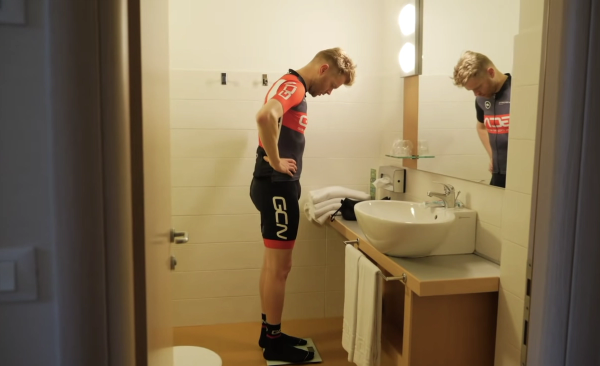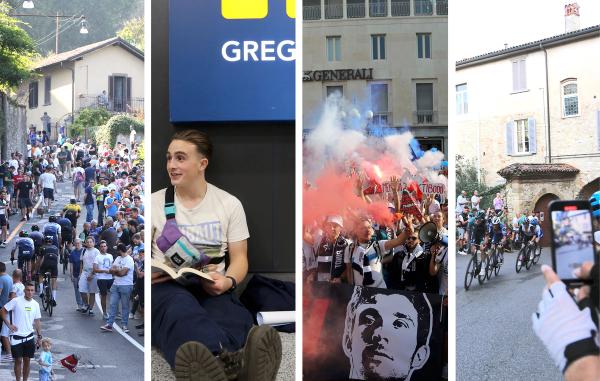London to Cape Town: The rookie cyclist tackling an 18,000km bikepacking adventure
Rob MacLennan hardly cycled before last September, now he's midway through a bikepacking trip from London to the southern tip of Africa. GCN spoke to him to find out about his motivations and the challenges he's faced so far
Pete Trifunovic
Digital Content Creator
© Rob MacLennan
Rob MacLennan (left) is raising money for GiveDirectly as part of his epic bikepacking trip
Cycling from London to Cape Town, South Africa is a challenge that’s by no means unheard of in the ultra-distance cycling community. That being said, the 18,000km expedition is something you’d typically expect to be undertaken by experienced individuals, like GCN’s very own Mark Beaumont, or at the very least, amateur cyclists well-accustomed to many hours in the saddle.
But what about a relative rookie attempting it? Could someone who’s never ridden more than 100km in a day, nor ever worn bib shorts before, complete it? Rob MacLennan doesn't see why not.
The 24-year-old from Oxfordshire, who spent part of his childhood in Malawi, had been brainstorming ideas for an “adventure of a lifetime” over the last few years. In December 2022, he finally settled on returning to Sub-Saharan Africa, albeit by bike.
“I went downstairs and told my brother, ‘I’m going to cycle to Cape Town’. He said, ‘No, you're not’ so I said, ‘Okay, well I have to do it now.”
MacLennan, an Economics graduate of St John’s College, Cambridge, is roughly half the distance through his challenge, having departed from London on 29 August.
Read more: Long-distance cycling tips from Mark Beaumont
His journey through West Africa had been temporarily halted in Benin though, due to an unavoidable, and somewhat farcical, delay to his Nigerian visa application. “It’s notoriously difficult to get hold of a Nigerian visa,” explained MacLennan, who instead opted to become a Benin citizen as a workaround.
After a heap of paperwork was filled out and one hefty payment made, he headed to the Nigerian embassy to finally acquire his golden ticket. “I rocked up a couple of days ago, and they told me the ambassador had gone on holiday. And no one else was allowed to process the visas so I'm stuck for another week until the ambassador comes back.”
With plenty of time to kill, he sat down with GCN via a patchy phone call to discuss his experience so far - solo bikepacking across various landscapes to test himself and raise money for a cause close to his heart.
‘Robbo’ on the road
For the scale of the journey that he was embarking on, MacLennan’s preparation was, in the nicest way possible, hurried.
His limited cycling experience certainly raises eyebrows, with him even describing long bike rides as “just a bit boring and [something that] took up a lot of time.”
“I guess it was a bit strange that I decided that I was going to spend seven months cycling eight hours a day,” he swiftly added.
However, being out of his comfort zone, attempting to learn skills - like bike maintenance - along the way, and travelling in a way he’s never done before were key factors that attracted him to the challenge so much.
Despite only acquiring it just a week before setting off, MacLennan’s bike is a classic bikepacking steed. He’s riding a Salsa Fargo strapped up with a wide array of bags and bottle cages.
If the bike is heavily stocked with supplies it can weigh over 30kg but that hasn’t stopped MacLennan from setting a target of the end of March for reaching Cape Town.
Read more: Beginners' guide to bikepacking
He’s also aiming to raise £4000 for GiveDirectly by the end of it too. The nonprofit organisation sends donations directly to the world’s poorest households as cash.
“There's a lot of concern about some NGO (non-governmental organisation) work and how effective it is, with money just being wasted along the way. I really wanted to choose a charity that I thought was doing genuinely effective and empowering work and in the countries that I would be travelling through,” MacLennan added.
Taking the plunge
Before tackling the deserts and heat of Africa though, MacLennan had to traverse across Southern England, France and Spain.
“I do remember leaving on the first day and pedalling out of London thinking ‘what have I got myself into here?’ I was like ‘100km, that felt a long way’ and I’ve got to do that another 180 times.”

© Rob MacLennan
MacLennan at Trafalgar Square in London on Day 1 and his bike loaded up with the essentials while in France
Admitting that the European leg of the journey was somewhat overlooked given the size and difficulties that Africa would pose, he spent much of his first month getting used to the bike and learning some important bikepacking lessons.
A fellow bikepacker introduced MacLennan to Warmshowers.org, a platform designed to provide touring cyclists with a bed and, of course, a warm shower, for free with hosts typically being cyclists themselves.
“It was just great to meet other cyclists, and also quite often parents of cyclists. Talking about the journey, their experiences and motivations, that was definitely a big highlight.”
Several spare beds helped him through France and then Spain, with the Pyrenees and the La Rioja region in the north of the country serving as personal highlights for MacLennan.
After enduring a stint on Spain’s A-7, dubbed the ‘Highway of Death’, and celebrating his 24th birthday with friends near Malaga, MacLennan arrived in Morocco, and the African continent, via ferry. It was at this point that the scale of the challenge truly dawned on him.
“I just thought ‘Wow, the next time I see my friends and family I’ll have crossed this entire continent by bike’.”
Solo in the Sahara
Despite the prospect of not seeing a friendly face in person until the spring, MacLennan believes that a positive mindset has prevented loneliness from seeping into his adventure.
He’s been buoyed by audiobooks and podcasts to pass the hours spent in the saddle alongside regular calls to loved ones back home.
Meanwhile, although not fluent in French, the Oxfordshire native has still been able to have both meaningful conversations with locals and deal with various problems when they arise.
“It's definitely quite tough when you don't speak fluent French and often the locals here only speak a little bit of French as well. I think especially when I'm really tired and hungry and I've got something that I need to try and get across and I just can't express it, that can be quite frustrating. But I guess it's just one of those challenges that I've just got used to and I'm very glad that I do speak a bit of French.”
One of the toughest challenges MacLennan has had to overcome arrived not long after arriving on the continent.
A cracked rim found him stranded deep in the Sahara desert, 200km from the nearest settlement. After a few hours by the roadside, a lorry driver offered him a lift back to civilisation where a new part had to be shipped in from Northern Morocco, costing him several days' worth of progress.

© Rob MacLennan
MacLennan at the Tropic of Cancer and his bike in the Sahara
The climate in North Africa also proved tricky for MacLennan, where not only did the temperature reach upwards of 40 degrees Celsius but there were also limited places to shelter from the sun or top up on cold water.
From some of his lowest moments to one of his highest, reaching Senegal was more significant than previous border crossings.
“I'd spent the best part of a month cycling 2,500km through the Sahara, which is just this incredible expanse of desert and sand in every direction. The feeling of reaching this green savanna with trees and bushes and just greenery around me filled me with so much euphoria.”
Battling with his body
After narrowly avoiding several collisions while navigating the streets of Dakar, MacLennan faced a new set of challenges in the form of humidity, mountainous terrain and perhaps most hazardous of all, his own body.
Given his limited exposure to such long days in the saddle before the trip, he’s surprised at how well his body has coped with fatigue.
“When I do a big 150km day, even if there’s quite a few hills, I remember back in Spain those days would completely wipe me out. Now, obviously, I'm tired, but I just kind of feel fine afterwards,” he added.

© Guus Van Veen
MacLennan crossed paths with Russ Cook, aka The Hardest Geezer, earlier this month. Cook is running the length of Africa
However, while his legs might be playing ball, his stomach isn’t quite as compliant.
“Food poisoning has been a pretty regular occurrence,” MacLennan, who’s found himself bedbound on multiple occasions, admitted.
Pretty certain that he also contracted malaria whilst in Côte d'Ivoire - something he described in typically optimistic fashion as “not great” - the 24-year-old has got used to battling against his own body.
“It's not the most glamorous thing, having food poisoning and diarrhoea all the time. There are so many times when I'm cycling along and I have to dump my bike by the side of the road and jump into the nearest bush.
“I’ve just got used to relieving myself out in nature and hoping that my bike isn’t getting too much attention while I’m ‘sorting things out’ in a bush,” he confessed.
Nonetheless, a hefty diet is necessary for anyone tackling such a challenge. MacLennan estimates that he consumes between 4000 and 5000 calories a day. He’ll typically order two dinners and has developed a sixth sense for predicting if his meal “is going to give me the shits!"
Read more: How many calories do you burn when cycling?
It wouldn’t be a cycling adventure without some coffee either, even if most countries along his route typically offer no more than instant coffee. Guinea couldn’t be any further from that though. MacLennan described the country’s coffee culture as “unexpected but amazing.”
The 24-year-old also spoke fondly about Morroco’s tagine and the jollof rice with chicken that he sampled in Ghana.
Learning lessons every day
Ahead of the trip, MacLennan had several concerns about keeping himself and his bike safe while riding through Africa. Yet, so far, he’s hardly felt the need to use his bike lock.
“First of all, it's a very big, very identifiable bike. It's pretty hard to run off with a fully loaded 30kg touring bike if you're not used to cycling it,” he explained.
While his concerns about keeping hold of his bike have been alleviated for now, keeping it in good working is another matter.
“You can’t just pop down to the local bike shop,” he admitted bluntly.
Carrying a plethora of spares has become the norm now, with road conditions making punctures and worn brake pads routine occurrences. That being said, for more technical tasks, the lack of bike shops hasn’t always been a problem. If a new part isn’t required and a bodged repair will do, MacLennan has never been too far from a solution.
“The good thing is that there are mechanics everywhere and there have been from Morocco into West Africa. So whenever I've had issues where my rack breaks or I need to get something adjusted then there’s someone by the roadside who's pretty capable.”
The 24-year-old is keen to fix any issues before they become too serious, especially with more remote countries on the horizon, like the Democratic Republic of the Congo, where spare parts will be difficult to come by.

© Rob MacLennan
A typical camping spot in Guinea and some Gambian locals offer some roadside maintenance
Speaking of the future, MacLennan is gearing up for whatever the rest of his trip may throw at him. Whether it’s Cameroon and its volcanic mountains, the Congo rainforest or Angola and its Portuguese-speaking population, he’s looking forward to it all with an open mind.
His experiences have not just altered his perspective on the trip but also - to an extent - his normal life back home. After having such a busy lifestyle in the UK, he admits that it has made him assess things from a different angle.
“In general, your day boils down to sourcing enough calories and water, cycling however far you’re planning to cycle, and finding somewhere to sleep. It's actually quite a short checklist of things that you have to do,” he stated poignantly.
Being completely self-sufficient has its stresses but MacLennan sees its value too. It’s allowed him to share intimate experiences with local people, like sheltering in the tent of a Bedouin who was tending to his camels in remote Mauritania.
“It’s just really amazing to have those kinds of experiences that you have when you’re solo bikepacking.
Read more: How to plan a bikepacking route, with Markus Stitz
“The world is far more connected than it seems,” he added, reminiscing over his time on the road so far.
The economics graduate also hopes that it’ll impact how he views day-to-day life once back home, providing him with more conviction surrounding what he actually should be prioritising in life.
“Taking this time away and travelling through so many different cultures, looking at life in different ways and talking to people with very different outlooks definitely challenges some of those cultural norms and conceptions that I've had living in the UK for the past 10 years,” he candidly admitted.
Before then though, MacLennan has over 8,000km of road (and dirt track) to tackle and potentially several ill-timed bouts of food poisoning to overcome.
It might appear to be an enormous challenge from the outside but he’s not getting overwhelmed by it.
“I’m just breaking it down into ‘what do I need to do today?’ and not getting too worried about things that might go wrong that are out of your control.”
You can support Rob MacLennan's fundraising effort towards GiveDirectly by donating to his JustGiving page.










